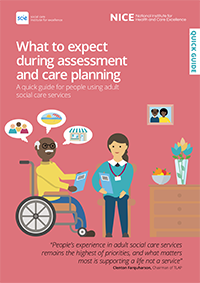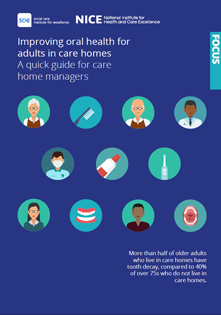Adult social care and support helps people to achieve the outcomes that matter to them. People’s experience of care and support, and how much they feel supported to live their life the way they want, is of key importance.
Around two thirds of people said they were extremely or very satisfied with the care and support they received from adult social services in 2017/18. This is according to NHS Digital's Personal Social Services Adult Social Care Survey in England, which asked over 65,000 people what they thought about the local authority funded or managed care and support they received.
Adult social care is delivered by thousands of different provider organisations. This means there is very little information about how well care processes recommended by NICE are being carried out nationally, and so we have used these survey results to look at outcomes for people using care and support services.
People's control over their daily life
Although most people were satisfied overall, only around a third of survey respondents said they can spend their time and have as much control over their daily life as they want.
Our guideline and quality standard on people’s experience using adult social care services aim to help people understand what care they should expect. This will improve their experience by supporting them to make decisions about their care and support. We say that people’s preferences and needs should be the basis on which to provide care and support to live an independent life.
Adult social care is provided in 3 main settings:
- residential care homes
- nursing care homes
- in the community.
People using community services live at home; this includes homes such as supported living and sheltered housing.
When people were asked about having control over their lives and how they spend their time, the survey results varied depending on where care and support was delivered. People using nursing care or community services were less likely to give a positive answer to these questions.
NICEimpact adult social care:
- Introduction
- People's experience of care and support
- Managing medicines
- Intermediate care including reablement
- Using our quality standards to improve adult social care
- Commentary
- Published July 2019

Most people who have help from adult social care services are satisfied overall. But surveys suggest that more could be done to make sure people feel in control of their lives.
Our quick guide on what to expect during assessment and care planning helps people using adult social care services understand that services should help them live their life the way they want to. It’s a quick, easy way to access key information from NICE.
I was really disappointed with the care I got at first. I didn't like having someone in my home and they seemed to come and go. But things got better when the same carer came more often and she knew what I needed help with.
I have as much control over my daily life as I want
I'm able to spend my time as I want, doing things I value or enjoy
More could be done to make sure that everyone using care and support services feel in control of their lives, particularly people using community services and nursing care.
Good care and support
Less than half the survey respondents said they have as much social contact as they want with people they like. We say that people should be helped to maintain the personal relationships and friendships that matter to them. People using community services were least likely to agree with this statement. So, while everyone could be helped to have more social contact with people they like, more could be done for this group in particular.
More people said they feel clean and able to present themselves the way they like, with 58% of all respondents agreeing with this statement. Making sure that people’s personal care needs are responded to in a dignified manner is a key part of NICE-recommended care. Although these results were better overall, less than half the respondents using nursing care said they feel clean and able to present themselves the way they like.
Do you have as much social contact as you want with people you like?
Do you feel clean and able to present yourself the way you like?
More could be done to make sure that everyone using care and support services has enough social contact and feels clean and able to present themselves the way they like.
Supporting adults with learning disabilities
Seventy-eight percent of adults using learning disability support services said they’re satisfied with the care and support they receive, but not everyone is able to spend their time as they like.
NICE has published a suite of guidance, standards and advice to help support people with learning disabilities to live well. Our guideline on the care and support of people growing older with learning disabilities aims to support people to access the services they need as they get older. It does not give a specific age range in the recommendations because adults with learning disabilities often experience age-related difficulties at a younger age.
Overall, adults using learning disability support services say they have satisfactory experiences of care. Most people (78%) said that the way they are helped and treated makes them think and feel better about themselves.
There is still more that can be done, particularly around making sure that people have as much control over their lives as they want. NICE says that practitioners should help people with learning disabilities to think about what they want from life as they age, and should ensure that care and support is tailored to their needs, strengths and preferences.
Being involved in my care is very important to me. I don't like people making decisions about me without involving me. I like to be kept up to date with what is happening after I've been assessed. I don't like not being told the reasons for decisions.
Using our social care guidance to improve quality of care

Healthwatch Isle of Wight used our guideline on older people with social care needs and multiple long-term conditions to help improve the quality of care in local residential care and nursing homes.
When they looked at Care Quality Commission (CQC) inspection results, they found that the quality of care provided on the Isle of Wight compared badly with other areas in England.
Using feedback from the public, they identified themes and trends including poor personalised care, poor access to activities, and poor management of nutrition and fluids. They used NICE guidance to describe good care and highlighted this to service providers, council members and members of the public so everyone knew what they should expect.
A team of Healthwatch authorised representatives visited 13 nursing and residential care homes and spoke to staff, residents and their families about their experiences. After sharing what they heard with the local authority, Clinical Commissioning Group and CQC, steps have been taken to improve care.
For example, residents now have a say in the types of activities they want to do, which has helped improve their quality of life. Thanks in part to Healthwatch Isle of Wight’s efforts, most care and nursing homes have since received a good CQC rating and no homes are rated as inadequate. Healthwatch Isle of Wight have described their project, and what they learned during it, in a NICE shared learning example.
The oral health of people who live in care homes

The CQC recently carried out a review of oral health care, asking staff in 100 homes whether they were aware of NICE’s guidance and were offering care in line with our recommendations.
This is important because poor oral health can affect people’s ability to eat, speak and socialise. Our guideline and quality standard aim to maintain and improve the oral health of people who live in care homes.
The CQC found that more than 60% of interviewees had heard of NICE’s guidance, although only 28% said they’d read it. Some care homes were offering care in line with our guidance, even when they were not aware of this. Nearly three-quarters of interviewees said that residents had their oral health assessed on admission and 70% said each resident has an oral health section within their care plan.
However, only a quarter of interviewees said their care home has a policy that sets out plans and actions to promote and protect residents’ oral health. Nearly half said that their staff did not receive specific training in oral health care. We hope that the CQC review will draw attention to this important area of care and raise awareness of our guidance.
Implementing NICE guidance in a local authority
To help provide excellent social care to people in Coventry, the city council have established a NICE implementation group. It aims to improve the quality of social care provision by making sure that services and the people working in them are aware of national policies and evidence-based practice. The group, which was set up by the principal social worker, carries out assessments to understand how services align with NICE recommendations and then monitors the implementation of actions.
By completing baseline assessments and relating outcomes to other data, such as data from complaints, the group has produced a robust assessment of the services they provide and raised the profile of social care within the council. They’ve also increased their understanding of different service areas by working together. More information about how the group works, and the key things they’ve learned, are available in a NICE shared learning example.

Our quick guide on improving oral health for adults in care homes is aimed at care home managers. It gives easy access to our recommendations.